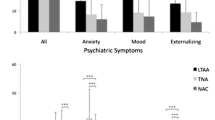Abstract
Background
Significant neurological symptoms may be overlooked because of the traditional view that the non-Korsakoff’s psychosis, middle aged alcoholic misuser is neurologically preserved.
Aims
In this study, we wanted to investigate the presence of neurological symptoms in individuals with misuse or dependence on alcohol who were abstinent for at least 1 month.
Method
We used two scales from the Minnesota Multiphasic Personality Inventory-2 (MMPI-2) to ascertain the presence of both neurological symptoms (HEA-2) and symptoms of general health concern (HEA-3) in 70 individuals who had a diagnosis of alcohol misuse or dependence, who were abstinent for greater than 1 month.
Results
Individuals reported significantly more neurological symptoms than general health difficulties (p < 0.001). We detected neurological symptoms, unlike general health difficulties in individuals who were abstinent from alcohol for 12 months. When we examined diagnostic subgroups, general health difficulties were most present in individuals with anxiety disorders; however, neurological difficulties were present across diagnostic groups.
Conclusion
Neurological symptoms persist to a greater extent than general health concerns in individuals who previously were dependent or misused alcohol.
Similar content being viewed by others
References
Schuckit MA, Hsselbrock V (1994) Alcohol dependence and anxiety disorders: what the relationship? Am J Psychiatry 151:1723–1734
Lewis CE, Helzer J, Cloninger CR, Coroughan J, Whitman BY (1982) Psychiatric diagnostic predispositions to alcoholism. Compr Psychiatry 23:451–461
Babor TF, Caetano R, Casswell S, et al (2003) Alcohol: no ordinary commodity. Research and public policy. Oxford University Press, Oxford
Anderson P, Baumberg B (2006) Alcohol in Europe: a public health perspective. Institute of Alcohol Studies, London
Ashley MJ, Rankin JG (1980) Hazardous alcohol consumption and diseases of the circulatory system. J Stud Alcohol Drugs 41:1040–1070
Elwood JM, Pearson JC, Skippen DH et al (1984) Alcohol, smoking, social and occupational factors in the aetiology of cancer of the oral cavity, pharynx and larynx. Int J Cancer Suppl 34:603–612
Nutt D (1999) Alcohol and the brain. Pharmacological insights for psychiatrists. Br J Psychiatry 175:114–119
Harper CG, Giles M, Finlay-Jones R (1986) Clinical signs in the Wernicke–Korsakoff complex: a retrospective analysis of 131 cases diagnosed at necropsy. J Neurol Neurosurg Psychiatry 49:341–345
O’Malley SS, Krishnan-Sarin S (1998) Alcohol and neuropsychiatric disorders. Curr Opin Psychiatry 11:253–257
Thuluvath PJ, Triger DR (1989) Autonomic neuropathy and chronic liver disease. Q J Med 72:737–747
Daly A, Ward M, Moran R (2006) Activities of Irish Psychiatric units and hospitals 2005. Health Research Board, Dublin
Henry OC, Chin A, Lawler B (2003) Alcohol use in Ireland—can we hold our drink? Ir J Psych Med 20:109–110
Edwards G (2000) Addiction treatment and the making of a large claim. Addiction 95:1755–1757
Yohman JR, Parsons OA, Leber WR (1985) Lack of recovery in male alcoholics’ neuropsychological performance one year after treatment. Alcoholism (NY) 9:114–117
Knight RG, Longmore BE (1994) Clinical neuropsychology of alcoholism. Lwarence Erlbaum Associates Publishers, Hove, p 336–337
Butcher JN, Graham JR, Ben-Prath YS, Tellegen A, Grant Dahlstrom W, Kaemmer B (2001) Manual for administration, scoring, and interpretation Revised Edition MMPI-2. Minneapolis, University of Minnesota Press
Manning V, Wanigaratne S, Best D et al (2008) Changes in neuropsychological functioning during alcohol detoxification. Eur Addict Res 14:226–233
McCrady BS (1987) Implications of neuropsychological research findings for the treatment and rehabilitation of alcoholics. In: Parsons OA, Butters N, Nathan PE (eds) Neuropsychological of alcoholism: implications for diagnosis and treatment. Guilford Press, New York, pp 381–391
McCrady BS, Smith DE (1986) Implications of cognitive impairment for the treatment of alcoholism. Alcohol Clin Exp Res 10:145–149
Sullivan EV, Rosenbloom MJ, Lim KO, Pfefferbaum A (2000) Longitudinal changes in cognition, gait, and balance in abstinent and relapsed alcoholic men: relationships to changes in brain structure. J Neuropsychol 14:178–188
Bates ME, Bowden SC, Barry D (2002) Neurocognitive impairment associated with alcohol use disorders: implications for treatment. Exp Clin Psychopharmacol 10:193–212
Khalily TM (2009) Neuropsychology and its relevance to clinical psychology in the non-specialist adult mental health setting. Ir J Psych Med 26:131–133
Hase HD, Goldberg LR (1967) Comparative validity of different strategies of constructing personality inventory scales. Psychol Bull 67:231–248
Burisch M (1984) Approaches to personality inventory construction: a comparison of merits. Am J Psychol 39:214–227
Hoelzle JB, Meyer GJ (2008) The factor structure of the MMPI-2 restructured clinical scales. J Pers Assess 90:443–455
Sellbom M, Graham JR, Schenk PW (2006) Incremental validity of the MMPI–2 Restructured Clinical (RC) scales in a private practice setting. J Pers Assess 86:196–205
Simms LJ, Casillas A, Clark LA et al (2005) Psychometric evaluation of the Restructured Clinical scales of the MMPI–2. Psychol Assess 17:345–358
Author information
Authors and Affiliations
Corresponding author
Rights and permissions
About this article
Cite this article
Khalily, M.T., Hallahan, B. The occurrence of neurological symptoms in currently abstinent misusers of alcohol. Ir J Med Sci 181, 473–477 (2012). https://doi.org/10.1007/s11845-011-0801-6
Received:
Accepted:
Published:
Issue Date:
DOI: https://doi.org/10.1007/s11845-011-0801-6




